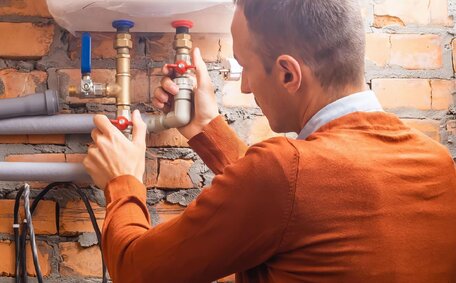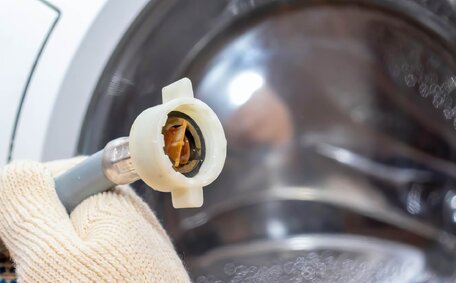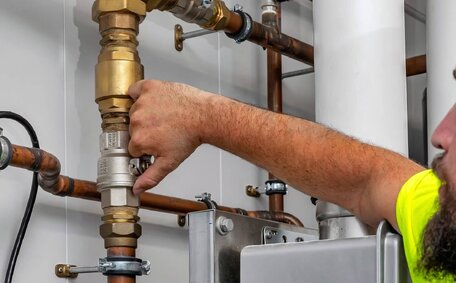Introduction to Gas Leaks
Gas leaks, arising from issues with natural gas or propane systems, can be due to defective appliances or deteriorated piping.
Detecting gas leaks promptly is critical for avoiding dangers such as explosions, fires, and carbon monoxide poisoning. Homeowners can utilise straightforward methods for leak detection and prevention.
This guide covers signs and causes of gas leaks, testing instructions, and essential safety measures, also highlighting when professional advice is necessary to ensure household safety.
Signs of a Potential Gas Leak
Several signs can alert you to a potential gas leak in your home or business.
Natural gas emits a sulphur-like odour, similar to rotten eggs, due to the addition of mercaptan, allowing scent detection of leaks. If a strong gas odour is present, turning off your gas supply is advised.
Visible indicators may be present on your gas appliances or lines hinting at a leak. Signs can include:
- Dirt or dust blowing from a pipe or fitting
- Dead vegetation or discoloured soil near gas lines
- Flames coming from somewhere unexpected
- Bubbling in standing water where gas may come out over a gas line
A leak can be audibly detected through a hissing or whistling sound, especially near appliances such as your stove, indicating an escape of pressurised gas.
Immediate response to these signs is essential to prevent potential hazards. If you suspect a gas leak through odour, visual or audible signs, take swift safety measures.
Smell
Mercaptan, an odorant, is added to natural gas to impart a distinctive, sulphur-like scent, enabling leak detection before they pose a risk. Any hint of gas smell should prompt immediate action.
The steps you should take include check gas leak appliances and connections when you suspect how to detect gas leak:
- Immediately evacuate the area, ensuring everyone is safely away from potential hazards.
- Avoiding use of any phones, electrical switches, garage door openers, or anything that could cause a spark.
- Opening windows to ventilate.
- Calling your local gas company or emergency services once outside.
Never ignore gas odours, particularly in the kitchen, as leaks can escalate quickly; safety should always come first.
Visual Signs
Some gas leaks may show signs you can see, around gas lines or appliances. Watch for these clues:
- Dirt or dust blowing from a pipe connection or appliance
- Dead vegetation or discoloured soil near buried gas lines
- Bubbling water along the path of an underground gas line
- Flames or smoke where they shouldn’t be, like near metres or pipes
- A dense white cloud or fog near a leak
Physical indicators like these can suggest a gas leak; do not ignore them. Immediately contact your gas company or emergency services if you observe such signs.
Sounds
Beyond scents and visuals, listening for sounds can also indicate potential gas leaks. Pressurised gas escaping from pipes, fittings or appliances can make distinct hissing or whistling noises.
Here are some examples of how detect gas leak by listening for sounds that may indicate one:
- A high-pitched hissing near a gas appliance or line
- A whistling sound coming from a small hole or crack in a pipe or fitting
- Hissing when a gas tap or valve is slowly opened or closed
Sounds generally intensify with increased gas flow, necessitating immediate action. Unusual hissing or whistling from the gas system warrants urgent investigation, as they indicate escaping gas.
Audible signs of a gas leak should never be ignored. Take quick action by shutting off gas valves, ventilating the property, evacuating everyone, and calling emergency gas services for assistance. While there gas leak occurrences aren’t extremely common, it’s vital to catch them early.
Testing for Gas Leaks
Carrying out a test gas procedure with a sound approach is crucial for safety when you discern possible gas leakage. There are a few DIY methods homeowners can use on how to detect a gas leak effectively.
Gas Detector
Using leak detectors, specifically designed to identify methane and LPG, offers a quick solution for detecting gas leaks in the air.
- Purchase an approved gas leak detector for your home safety.
- Turn off all appliances and ensure not to use natural gas during testing.
- Use an approved gas leak detector to scan along gas lines, pipes, connections, meters, and appliances. The detector will show a visual and audible alarm if gas is present.
- Mark any problem areas for professional repair.
Soapy Water Test
A simple test where leaks can occur involves spraying connections with a soap water solution and watching for bubbles:
- Check your connections by making a 50/50 mix of dish soap and water in a spray bottle.
- Turn off gas appliances and turn off the main gas valve.
- Spray the solution generously across pipes, fittings, valves, and appliances.
- Check for bubble formation, which indicates escaping gas.
- Identify areas with bubbling to indicate leaks and contact a technician for repairs.
Pressure Test
Using specialised equipment, plumbers can conduct pressure tests on your gas system, checking for leaks by monitoring pressure gauge drops, which indicate gas escape.
Regardless of the detection method, treat all gas leaks with urgency and engage a licensed gas fitter if any issues are revealed. Do not attempt gas line, appliance, or air conditioning unit repairs yourself.
Dangers of Gas Leaks
Gas leaks pose serious risks that demand immediate attention. Potential dangers include:
- Explosions - Leaking gas can accumulate in enclosed spaces and explode if conditions ignite gas by a spark or flame source.
- Fires - Gas is highly flammable and Gas leaks can lead to dangerous fires.
- Suffocation - Large volumes of leaking gas can displace breathable oxygen in the air.
- Carbon Monoxide Poisoning - This odourless, poisonous gas can create a natural gas leak scenario along with methane, causing nausea, dizziness, and even death.
- Property Damage - Explosions and fires due to leaks can severely damage homes and businesses.
The severity of these risks underlines the urgency of identifying and resolving gas leaks promptly. Suspected leaks should be met with immediate evacuation, spark/flame avoidance, space ventilation, and emergency service contact.
Remain vigilant for any sign gas releases, such as unusual scents similar to rotten eggs. Install carbon monoxide detectors for added protection. Prompt response can help minimise the health dangers and property damage possible with gas leaks.
Preventing Gas Leaks
There are several effective strategies that answer the question 'what do I do to prevent hazardous gas leaks in my home or business’:
Regular Maintenance
Have all gas appliances, including your hot water system and your bbq gas units, professionally inspected and serviced annually. How to detect issues with hot water systems, stoves/ovens, dryers, fireplaces, and space heaters. Regular maintenance helps detect any potential issues like faulty connections or corroded pipes before leaks occur.
Install Gas Detectors
Installing methane detectors and carbon monoxide alarms bolsters safety and aids in the ability to detect gas leak scenarios. Timely gas detection is key, and detectors can provide this efficiency. Place detectors near sleeping areas and on every floor.
Inspect Pipes and Metres
Visually identify the gas pipe running into your building as well as the gas meter on a regular basis. Watch for corrosion, damage, or loose fittings on pipes and appliances, including your gas stove. Also cut back any plants or bushes growing near external gas pipes.
Hire Professionals
Always hire licenced gas technicians to install, repair, or replace appliances and gas lines, especially in the event gas leaks occur. Professionals ensure code compliance and proper materials. They can also conduct thorough leak inspections.
Vent Properly
Ensure all gas appliances have adequate ventilation to avoid buildup of carbon monoxide. Appliances should vent outside, not into internal rooms or attics.
Proactive measures can prevent gas leaks and minimise associated risks. Remain vigilant for indicators such as strange smells or sounds, and consult gas experts promptly if problems are detected.
When to Call a Professional
While there are DIY methods for detecting gas leaks, it’s vital to contact a licenced professional promptly in certain situations:
- If your DIY leak test shows signs where a gas leak can occur
- If you do suspect gas issues by smell or notice other warning signs
- To install or replace gas appliances, pipes, or fittings
- For annual servicing and inspections on all gas equipment
- If you notice an unaccountable surge in your gas bill amounts
- To check for leaks after an earthquake or other natural disaster
- For major gas line repairs, pressure testing, and addressing pipe leak problems
Saint Marys Plumbing, with more than 40 years’ experience, adeptly manages gas leaks, conducting extensive checks and safe repairs.
Reach out to us at any time at 1300 349 338 or [email protected] for leak suspicions or gas services.
Limit yourself to conducting only basic leak tests.
For actual gas leaks or appliance concerns, contact professional technicians to ensure risk mitigation with appropriate inspections and repairs. Don’t hesitate to approach our team with any worries.
Summary
Licensed gas technicians possess the expertise required to comprehensively inspect and correctly fix leaks.
Regular professional servicing prevents issues, yet remain conscious of leak indicators between inspections.
Take all precautions seriously, as gas leaks can escalate rapidly, causing explosions, fires, carbon monoxide poisoning, suffocation hazards and property damage. Contact our team at Saint Marys Plumbing on 1300 349 338 or [email protected] anytime you need gas leak checks or repairs by qualified experts.
Regular professional servicing prevents issues, yet remain conscious of leak indicators between inspections






